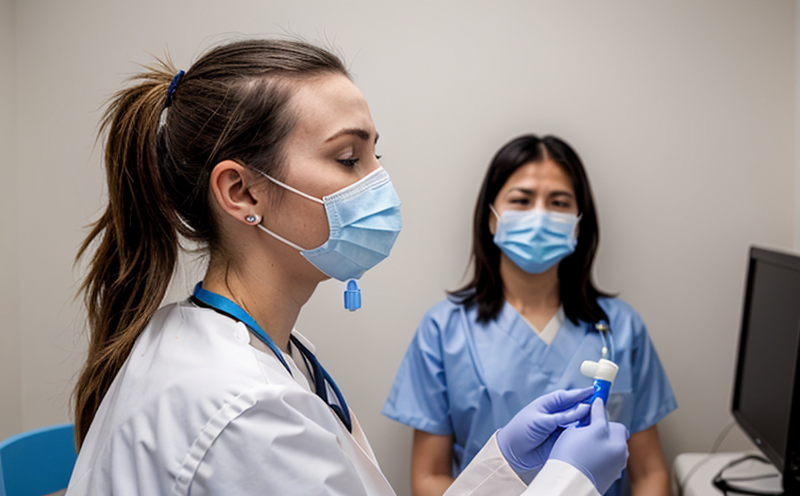Pasteurella multocida Testing in Bovine Respiratory Complex
The Pasteurella multocida testing in bovine respiratory complex (BRC) is a critical diagnostic tool that aids in the early identification and management of bacterial infections, particularly those caused by P. multocida. This bacterium plays a significant role in the pathogenesis of respiratory diseases affecting cattle, including pneumonia, bronchopneumonia, and pleurisy.
The prevalence of these conditions can have substantial economic implications for dairy and beef farms. The accurate diagnosis of P. multocida infections is essential to implement targeted treatments that minimize suffering in livestock while reducing the risk of zoonotic transmission. By incorporating advanced molecular techniques such as PCR, serological methods, and culture-based assays, laboratories can provide reliable results that inform on-farm management decisions.
The testing process involves several key steps: specimen collection from affected animals, transport to the laboratory under optimal conditions, and subsequent processing using specialized media or reagents. Once in the lab, samples are analyzed for the presence of P. multocida DNA through PCR technology or cultured on selective media that facilitate growth. Serological tests can also assess the immune response against this pathogen.
The importance of accurate and timely diagnosis cannot be overstated, as it allows veterinarians to tailor antibiotic therapy effectively, thereby minimizing treatment costs and preventing unnecessary exposure to antimicrobial agents. Additionally, identifying P. multocida infections helps prevent their spread within herds, ensuring biosecurity measures are robustly enforced.
Standardization of testing protocols is crucial for consistent results across different laboratories. Compliance with international standards such as ISO 15189 ensures that diagnostic procedures meet rigorous quality criteria. This standard promotes best practices in laboratory management and helps maintain high levels of accuracy, reliability, and traceability in test outcomes.
Understanding the epidemiology and clinical signs associated with P. multocida infections is vital for effective disease control strategies. Common symptoms include fever, lethargy, rapid breathing, and nasal discharge. Early detection through thorough diagnostic testing enables prompt intervention to address these issues effectively.
In conclusion, Pasteurella multocida testing in the bovine respiratory complex is an indispensable component of modern veterinary practice aimed at safeguarding animal health and welfare. It underscores the need for continuous improvement in diagnostic techniques and emphasizes the importance of collaboration between laboratory professionals, veterinarians, and farmers to achieve optimal outcomes.
Benefits
The implementation of Pasteurella multocida testing offers numerous advantages that contribute significantly to improved animal health and overall farm productivity. These benefits extend beyond mere disease detection to encompass broader economic, operational, and ethical considerations:
- Economic Efficiency: Early identification of P. multocida infections allows for targeted treatment plans, reducing the need for broad-spectrum antibiotics and minimizing treatment costs.
- Biosecurity Enhancement: By diagnosing and addressing respiratory issues promptly, farms can better prevent the spread of pathogens within herds, thereby maintaining healthier populations.
- Veterinary Support: Accurate diagnostic information supports veterinarians in providing more effective care tailored to individual cases rather than relying on general protocols.
- Ethical Responsibility: Minimizing unnecessary suffering and promoting humane practices aligns with ethical standards expected by consumers worldwide.
These benefits underscore the value proposition of advanced diagnostic testing in bovine respiratory disease management, making it an essential investment for quality assurance programs.
Environmental and Sustainability Contributions
Pasteurella multocida testing contributes positively to environmental sustainability by promoting responsible use of antibiotics. The accurate diagnosis of infections allows veterinarians and farmers to prescribe appropriate treatments only when necessary, thus reducing the risk of antibiotic resistance development. This practice also helps preserve natural ecosystems from potential harm caused by overuse or misuse of antimicrobial agents.
Moreover, the early detection of respiratory diseases through thorough testing ensures that affected animals receive timely care, potentially preventing them from contributing to greenhouse gas emissions associated with prolonged illness or death. By enhancing animal health and welfare, this testing contributes indirectly to sustainable agricultural practices.
Competitive Advantage and Market Impact
Laboratories offering advanced Pasteurella multocida testing in the bovine respiratory complex enjoy several competitive advantages that translate into significant market impacts:
- Innovation Leadership: Staying at the forefront of diagnostic technology enables laboratories to offer unique services not widely available elsewhere, attracting discerning clients seeking cutting-edge solutions.
- Reputation Building: Consistently delivering accurate and reliable results builds trust among stakeholders, including farmers, veterinarians, and regulatory bodies, fostering long-term relationships.
- Premium Pricing: The specialized nature of this testing allows laboratories to command premium pricing for their services, reflecting the value added by these high-quality diagnostics.
These factors contribute to a strong market presence and position laboratories as industry leaders in animal health diagnostics. By continually refining their methodologies and staying abreast of emerging trends, they ensure sustained growth and relevance within competitive markets.





